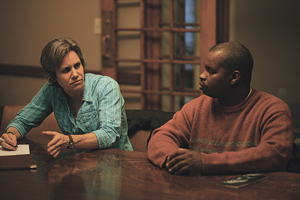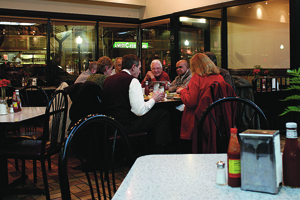Engaged citizens speak up: Café Society is talk of the town
By Deva Woodlydeva@uchicago.edu
News Office
 Photos by Beth Rooney |
|
For six years, Chicagoans have been meeting once a week at six coffee shops around town to discuss social and political hot topics through the Illinois Humanities Council's innovative community discussion program called Café Society. In November 2008, the Civic Knowledge Project brought Café Society to campus.
The Civic Knowledge Project’s successful adult literacy program Odyssey teamed up with the Illinois Humanities Council to start Odyssey Café Society, a discussion group that meets at the International House on the second Wednesday of every month.
Café Society aims to “foster a more robust civil society, more cohesive and interactive communities, greater media literacy, and a more informed and engaged citizenry.” The Odyssey Café Society shares these goals but also seeks to “offer opportunities for Odyssey graduates to remain engaged in the Humanities,” said Erika Dudley, Coordinator for Adult Education for the Civic Knowledge Project. Dudley brought Café Society to campus with the help of Amy Thomas Elder, Director of the Odyssey Project and Lecturer in the Graham School of General Studies.
 Above, Amy Thomas Elder and Marc Bragg engage in a discussion about domestic violence at a March meeting at International House. |
|
“We felt that Café Society was an ideal way for current and past Odyssey students to be a part of a large movement to foster discussion and debate in a relaxed, informal setting,” explained Dudley. The Odyssey Café Society is open to anyone, but Bart Schultz, Director of the Civic Knowledge Project, felt that it was important to serve the Odyssey students in particular. “The Odyssey students have regularly expressed an interest in having more opportunities to come to campus to engage in discussion with students and faculty. And the Civic Knowledge Project has always tried to facilitate such opportunities,” Schultz noted.
Unlike other Café Society groups around the city, the Odyssey group meets monthly instead of weekly, and the University coordinators choose discussion topics based on “what is timely and will be relevant and interesting to our group,” Dudley said.
 Members of both the Odyssey Café Society and the Valois Café Society discussion groups meet regularly to share opinions and insights about topics on the public’s mind. The Valois group members discuss Nadya Suleman, “octomom” in the popular press, and the implications of in vitro fertilization. |
|
Generally, 10 to 12 people participate in the discussion, and they often are a mix of Odyssey graduates and University students and faculty. That number typically generates lively and intimate conversation on topics from the troubling domestic violence between pop singers Chris Brown and Rihanna, to the dicey politics of privatizing public services.
In addition to the Odyssey Café Society, Hyde Park also hosts a long-running Café Society, which meets at the storied neighborhood bistro Valois on 53rd Street. A group of dedicated regulars, including several who have been meeting weekly since the program started, gather for the Valois Café Society. Bill Browning, a longtime participant, said, “I like the give-and-take of discussion at our meetings. It’s one of the few forums in present-day society where we can discuss topics like politics, religion and current events with both friends and strangers. It’s a big kick.”
In the future, Dudley is interested in hosting Hyde Park and other Café Society groups. “I think we are demonstrating and want to continue to show the ways that successful partnerships between the University and its neighbors can happen.”
![[Chronicle]](/images/sidebar_header_oct06.gif)